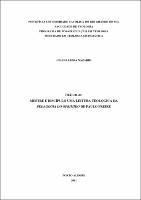| Share record |


|
Please use this identifier to cite or link to this item:
https://tede2.pucrs.br/tede2/handle/tede/5849Full metadata record
| DC Field | Value | Language |
|---|---|---|
| dc.creator | Nazario, Celina Lessa | - |
| dc.creator.Lattes | http://buscatextual.cnpq.br/buscatextual/visualizacv.do?id=K4473365U2 | por |
| dc.contributor.advisor1 | Zilles, Urbano | - |
| dc.contributor.advisor1Lattes | http://buscatextual.cnpq.br/buscatextual/visualizacv.do?id=K4727282T4 | por |
| dc.date.accessioned | 2015-04-15T12:50:20Z | - |
| dc.date.available | 2012-03-01 | - |
| dc.date.issued | 2011-12-22 | - |
| dc.identifier.uri | http://tede2.pucrs.br/tede2/handle/tede/5849 | - |
| dc.description.resumo | Esta pesquisa pretende responder à seguinte questão: Que interfaces podemos refletir de uma educação transformadora e cristã que estão presentes na área da educação scalabriniana hoje? A escola católica é um espaço privilegiado para exercer a sua missão de evangelizar. Refletimos sobre o diálogo: Mestre e Discípulo, através da leitura teológica da Pedagogia do oprimido, buscando o seu fio condutor na pedagogia do Mestre Jesus, na passagem de Lc 24,13-35, Caminho de Emaús , fazendo-se presente na pedagogia da educação scalabriniana. Identifica-se a contribuição de Paulo Freire, com um olhar na proposta do Evangelho de Lucas 24,13-35 e na educação scalabriniana que Dom João Batista Scalabrini lança como tarefa para uma congregação. Paulo Freire acreditava que a sociedade poderia ser transformada por meio da educação problematizadora dialógica. O diálogo se fundamenta nos elementos constitutivos, como amor, fé, humildade, confiança e esperança presente no pensamento pedagógico de Paulo Freire e de João Batista Scalabrini, que também fazem parte da reflexão teológica cristã. Em (Lc 24,13-35) o Caminho de Emaús , está o caminho da revelação da verdadeira pedagogia. Jesus é o Caminho a Verdade e a Vida. A pedagogia scalabriniana também busca, em seu jeito de educar, responder os apelos da Igreja e da sociedade que está em constante mobilidade. Fazendo do ambiente escolar um espaço teológico, a escola contribui com o carisma assumido na Igreja. Neste pensar do diálogo: mestre/discípulo há possibilidade de refletir a educação como possível fazer teológico na educação. | por |
| dc.description.abstract | This research aims to answer the following question: What interfaces can we reflect from a transformative and Christian education, that are in the area of scalabrinian education nowadays? The catholic school is a privileged space to exercise the mission of evangelization. We reflected upon the dialogue: Master and Disciple, through a theological reading of the Pedagogy of the Oppressed, looking for its conducting wire in Master Jesus pedagogy in the passage of Lc 24, 13-35, The Way to Emmaus, that is part the scalabrinian education pedagogy. We identified Paulo Freire s contribution, in the proposal of the Gospel of Luke 24,13-35 and in the scalabrinian education that Don Giovanni Baptista Scalabrini launches as a task for a congregation. Paulo Freire believed that the society could be transformed through education problem-solving dialogue. The dialogue is based on elements, such as: love, faith, humility, confidence and hope, that are in Paulo and Giovani Battista Scalabrini s view of education, which are also part of Christian theological reflection. (Lc 24, 13-35) The Way of Emmaus is the path of revelation of the true pedagogy. Jesus is the way towards Truth and Life. Besides, the scalabrinian pedagogy aims, in the way that education happens, to answer the claims of the Church and society, that is constantly moving. Making the school environment a theological space, the school contributes to the charisma that is assumed in the Church. In this type of dialogue, in a master/disciple, it is possible to reflect upon education as a way to act in theological education. | eng |
| dc.description.provenance | Made available in DSpace on 2015-04-15T12:50:20Z (GMT). No. of bitstreams: 1 436919.pdf: 786619 bytes, checksum: 390665bad645bfec8c38afde38cd16f1 (MD5) Previous issue date: 2011-12-22 | eng |
| dc.format | application/pdf | por |
| dc.thumbnail.url | http://tede2.pucrs.br:80/tede2/retrieve/17070/436919.pdf.jpg | * |
| dc.language | por | por |
| dc.publisher | Pontifícia Universidade Católica do Rio Grande do Sul | por |
| dc.publisher.department | Faculdade de Teologia | por |
| dc.publisher.country | BR | por |
| dc.publisher.initials | PUCRS | por |
| dc.publisher.program | Programa de Pós-Graduação em Teologia | por |
| dc.rights | Acesso Aberto | por |
| dc.subject | TEOLOGIA | por |
| dc.subject | FREIRE, PAULO - CRÍTICA E INTERPRETAÇÃO | por |
| dc.subject | RELIGIÃO E EDUCAÇÃO | por |
| dc.subject | SOCIOLOGIA EDUCACIONAL | por |
| dc.subject.cnpq | CNPQ::CIENCIAS HUMANAS::TEOLOGIA | por |
| dc.title | Diálogo: mestre e discípulo uma leitura teológica da Pedagogia do oprimido de Paulo Freire | por |
| dc.type | Dissertação | por |
| Appears in Collections: | Programa de Pós-Graduação em Teologia | |
Files in This Item:
| File | Description | Size | Format | |
|---|---|---|---|---|
| 436919.pdf | Texto Completo | 768.18 kB | Adobe PDF |  Download/Open Preview |
Items in DSpace are protected by copyright, with all rights reserved, unless otherwise indicated.




